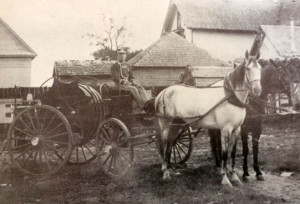When one of the fire trucks in Greenville was damaged recently, I began to wonder about older fire trucks, when the first came on the scene, and what was used before motorized vehicles. After all, police and fire departments, their equipment and personnel are quite important to all citizens.
Fires have always been a bane to cities, and Greenville is no exception. There was the Great Fire of London, the Chicago Fire (did Mrs. O’Reilly’s cow really start it when she kicked over the lantern), and the fire in Rome when Emperor Nero fiddled. None of Greenville’s fires have been so notable, although many have been tragic particularly the Ende Hotel fire.
The Ende Hotel sat on the southeast corner of Johnson and Washington Streets in Greenville. Fred Ende owned that spot since his arrival here about 1857. With the arrival of the railroad in the fall of 1880, Mr. Ende decided to build an elegant three-story respite for travellers. Work began in 1881. When the hotel opened, Mr. and Mrs. Ende moved into the hotel as permanent residents.
About 2:30 A.M. on April 17, 1883 fire swept through the hotel. Guests and residents first heard a loud crash, followed by another crash and cries of “Fire, fire.”
The northwest wall fell in trapping many who were sound asleep.
Mayor A. F. Clements was one of the first on the site. Seeing the tragedy unfold, he immediately sent a telegram to Sherman, requesting assistance from that fire department. Quickly the Sherman Fire Department loaded their fire wagon on a special train that arrived in a record time of fifty-five minutes. When the fire was extinguished thirteen lives were lost, many more injured including Mrs. Ende, and much of downtown Greenville was gone.
Fred Ende had insured his hotel. When he made claim the insurance company posed an interesting question. Did the building fall, and thus cause the fire, or did the fire cause the building to collapse? The insurance company claimed that the building was condemned 18 months after construction because the basement construction and walls were not adequate to support a three-story building. A lengthy court case followed before Ende was paid.
Within weeks of the fire a meeting of local men came together to organize a fire department. Named the Dick Hubbard Fire Department in honor of the governor of Texas at that time, the volunteers began practice on August 3, 1883. One year later, the next fire in town was not extinguished until it had destroyed several buildings. The next fire on February 1, 1886 destroyed a home and the Baptist Church before it was extinguished.
It wasn’t long until specially trained horses with paid drivers went to work for the fire department. However, firemen were still volunteers. By 1916 all personnel were paid and the first motorized fire truck arrived by train on January 17, 1916.
We still have fires, but such devastation hasn’t happened since adequate equipment and men now watch out for us. However, as usual I have a question. At one time the fire station was part of the Greenville Municipal Building. If the firemen were called out during a concert in the Auditorium, did they turn on the siren immediately or after they were out hearing range of the concertgoers?

